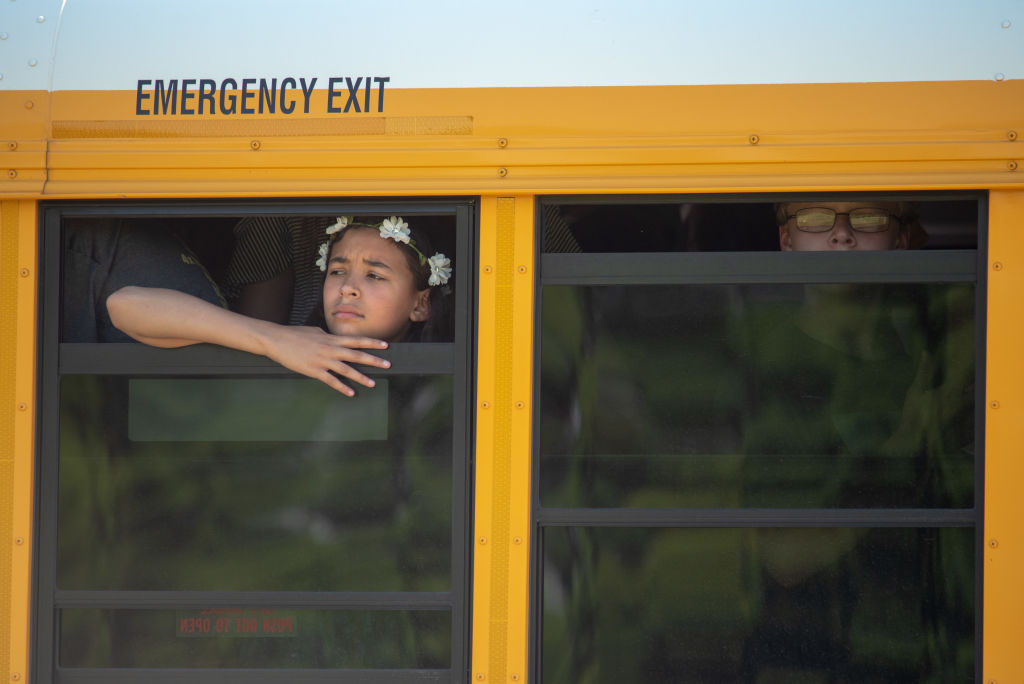How to talk to children about school shootings
There have been at least 58 school shootings in the United States so far in 2023. Nineteen of those were on college campuses and the remaining 39 were on K-12 school grounds, CNN reported.
The incidents have left at least 28 people dead and more than 67 injured, according to CNN’s analysis of events reported by the Gun Violence Archive, Education Week, and Everytown for Gun Safety.
The US federal government does not track school shootings, but according to the Washington Post, there’s been at least 386 school shootings since the Columbine school shooting of 1999.
With each school shooting, the number of people affected grows, as do the conversations parents and caregivers are forced to have with kids about the reality of gun violence in the U.S.
As a parent or caregiver, it’s only natural to be anxious and stressed about school shootings yourself, but the first step to take before talking to a child is to be sure that your own emotions are in check, Dr. Deborah Gilboa, family physician and resilience expert, told TODAY.
"We can't come to our kids and have the conversation if we're a wreck," Gilboa said to TODAY. "Then they're going to feel like they need to take care of us." If that’s the case, the expert recommends taking a pause or reaching out to a mental health professional first.
Photo: Claudia Wolff/Unsplash
Dr. Melissa Brymer, from the UCLA-Duke National Center for Child Traumatic Stress, told ABC news parents and caregivers “should be truthful with kids in an age-appropriate way.”
According to Gilboa, kids under 8 years-old may not need to talk about a school shooting, unless they experienced one or will hear about one some place else. In any case, she recommends to focus on the positive, such as the heroes of the story.
However, when young kids come up with questions such as why it happened, you should give a one-sentence story, Gilboa said. For example: “someone with a serious illness felt angry and hurt people, the expert exemplified.
Moreover, Gilboa stressed that parents should prevent their children from seeing pictures of the shooting or the news because the images will stick with children longer than words.
Photo: Annie Spratt/Unsplash
With older kids and especially teenagers, Brymer said parents should be prepared for a "much more in-depth conversation” that might leave you at a loss for words. However, it’s okay to not have an answer, according to another expert.
Physician Jennifer Ashton told ABC news that parents and caregivers shouldn’t be afraid to say they don't have an answer. If that’s the case, Ashton recommended they use dialogue like, "I don't have an answer to that but I'll help you find it."
"We shouldn't sit back and wait for them to come up and say, 'Mom, Dad, I'd like to talk about gun violence," Brymer said. "We're going to need to take the first step and come to them early and often and say, 'What are you thinking about? What are you afraid of? What questions do you have?'"
Instead of having a script in your head and flooding them with information, listen to what your kids have to say, especially if they talk about feelings, Gilboa said to TODAY.
Instead, according to physician Jennifer Ashton, you could say: "I know you're scared, so am I, but let me tell you what your teachers and what your parents and community are trying to do to help you stay safe.'"
Instead of discussing a school shooting only once, Robin Gurwitch, a clinical psychologist and Duke University professor, told ABC news it's crucial to continue the conversation over time.
Physician Gilboa said that helping kids focus on a sense of purpose after tragedy can help protect their mental health.
She said that parents and caregivers should ask a child if there is something that they can do together to help, or a way they can make a difference.
Brymer agreed with Gilboa saying it’s a good idea to encourage your kids to think about a club or some type of activity that they can do within their school “to show and create change”.
“Teenagers are looking for solutions and this generation believes in collaboration and social justice. You can ask ‘What are you doing? What would you like to do? What can we do together?'”, said Gilboa.
However, children may respond to disturbing news about mass shootings in different ways, and parents and caregivers should pay attention to see if their child's behaviors change, psychiatrist Janet Taylor told ABC News.
Younger children can become more clingy or suddenly want to sleep in bed with their parents, while older children may become isolated or develop a fear of going to school, the psychiatrist said.
If that’s the case, experts agree on not to hesitate to reach out to their pediatrician, school counselor or other mental health professionals.
More for you
Top Stories







































